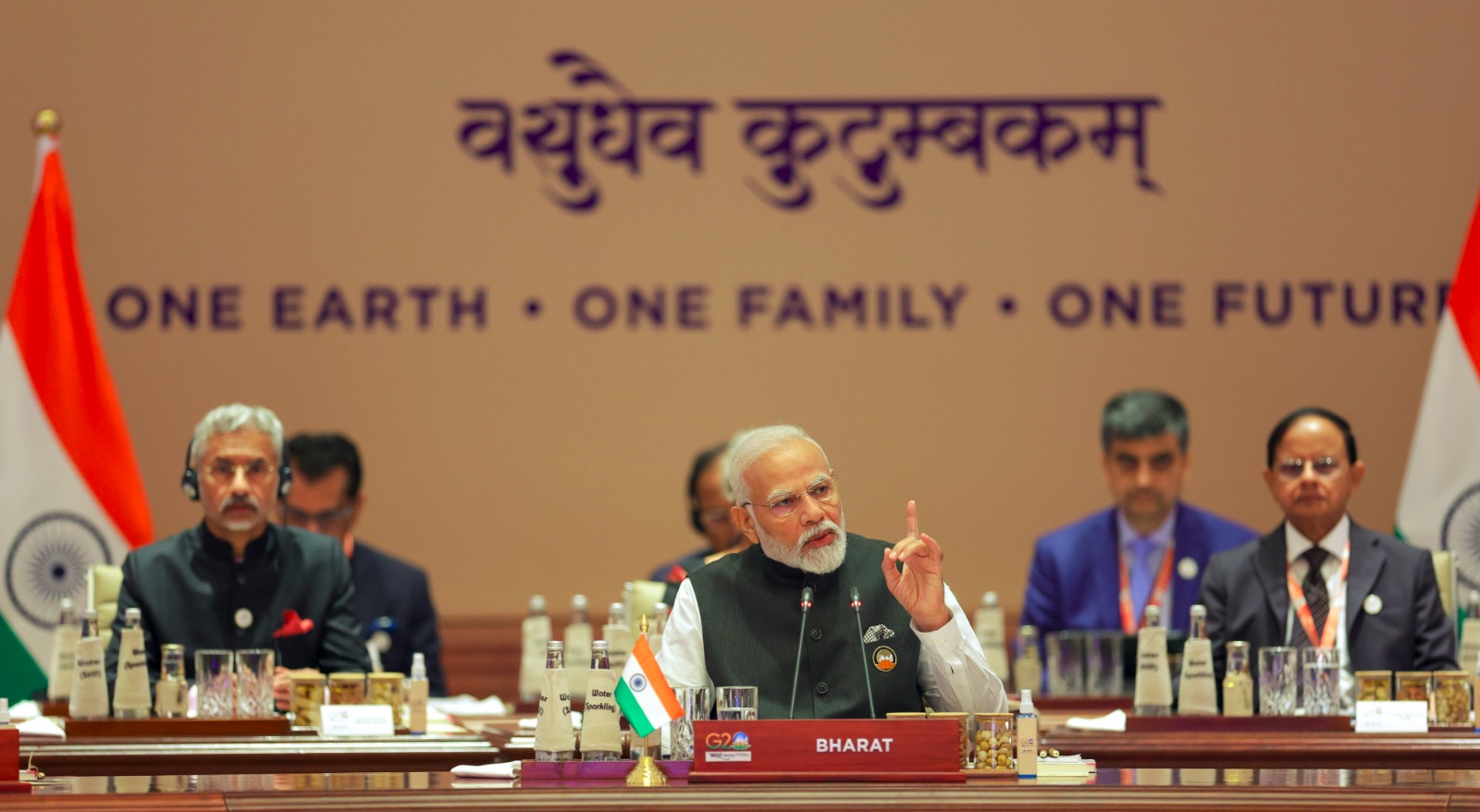
Author David Devadas decodes Delhi G-20 Declaration

NEW DELHI: The G-20 Leaders’ Declaration, issued at their annual summit last weekend, presents a bold vision of an integrated but egalitarian data-driven brave new world with a focus on ‘cities of the future,’ and ‘better, bigger and more effective’ multilateral development banks.
It offers crucial insights into what might be a radically transformed future — quite soon, and bears more than a shadow of the World Economic Forum’s data- and tech-driven blueprints.
The Declaration welcomes India’s ‘plan to build and maintain a Global Digital Public Infrastructure Repository (GDPIR), a virtual repository of DPI, (to be) voluntarily shared by G20 members and beyond.’ It talks of ‘digital public infrastructure’ as ‘an evolving concept’ and as ‘a set of shared digital systems, built and leveraged by both the public and private sectors.’ It further avers that ‘the rapid progress of AI promises prosperity and expansion of the global digital economy.’
The document welcomes discussions on ‘potential macro-financial implications’ of Central Bank Digital Currencies (CBDCs) ‘on cross-border payments as well as on the international monetary and financial system.’ For employment, it talks of mapping ‘global skill gaps’ and extending ‘the ILO and OECD Skills for Jobs Databases to G20 countries.’
READ MORE: India has finally arrived, but what took it so long?
It resolves ‘to deploy all available digital tools and technologies,’ including the use of digital technology by farmers, and welcomes ‘the establishment of the Global Initiative on Digital Health (GIDH) within a WHO-managed framework to build a comprehensive digital health ecosystem.’ Further, it commits members to ‘strengthening the global health architecture, with the World Health Organization (WHO) at its core.’
Taxation and development
Referring to a ‘sustainable and modern international tax system appropriate to the needs of the 21st century,’ it says: ‘We remain committed to the swift implementation of the two-pillar international tax package,’ and to resolving issues regarding the second pillar within 2023.
The Declaration notes: ‘Cascading crises have posed challenges to long-term growth. Facing an uneven recovery, and cognizant of the need to boost long-term growth, we will implement well-calibrated macroeconomic and structural policies. We will protect the vulnerable, through promoting equitable growth and enhancing macroeconomic and financial stability. Such an approach will help resolve the cost-of-living crisis and unlock strong, sustainable, balanced, and inclusive growth.’
It paints a dark picture, stating that: ‘Global economic growth is below its long-run average and remains uneven. The uncertainty around the outlook remains high. With notable tightening in global financial conditions, which could worsen debt vulnerabilities, persistent inflation and geoeconomic tensions, the balance of risks remains tilted to the downside.’
In this dark contest, the G20 Declaration indicates that fiscal strategies be developed domestically. ‘We, therefore, reiterate the need for well-calibrated monetary, fiscal, financial, and structural policies to promote growth, reduce inequalities and maintain macroeconomic and financial stability. We will continue to enhance macro policy cooperation and support the progress towards the 2030 Agenda for Sustainable Development.’
READ MORE: Opposition cries in vain, Bharat receives wide acceptance at G20
‘Billions to trillions’ urged for green energy
The Declaration deals with environmental challenges, and asserts in the preamble itself, that ‘no country should have to choose between fighting poverty and fighting for our planet.’ Yet, it urges that private as well as public investments be scaled up ‘from billions to trillions of dollars,’ encouraging ‘efforts to triple renewable energy capacity globally’ and urging ‘similar ambition with respect to other zero and low-emission technologies.’
It speaks of designing a ‘circular economy’ to ‘decouple our economic growth from environmental degradation and enhance sustainable consumption and production,’ and thanks India for ‘launching Resource Efficiency and Circular Economy Industry Coalition (RECEIC).’
Further, it notes the ‘Voluntary High Level Principles for Collaboration on Critical Minerals for Energy Transitions’ promoted by India. The document gives much space to controlling climate change, but bafflingly refers to both 1.5 and 2 degrees (c) as targeted limits on the increase of global temperature over pre-industrial levels.
For food security, it says that members are to ‘strengthen research cooperation on climate-resilient and nutritious grains such as millets, quinoa, sorghum, and other traditional crops including rice, wheat and maize.’
Global inclusion and gender equity
The Declaration dwells on a host of other issues, emphasising gender equality, ending plastic pollution, and the need to globally combat terrorism.
It speaks of a ‘new international legally binding instrument under the UN Convention on the Law of the Sea (UNCLOS) on the conservation and sustainable use of marine Biological diversity of areas Beyond National Jurisdiction (BBNJ).’ And, putatively targeting Chinese trawling, it commits to ‘ending illegal, unreported, and unregulated (IUU) fishing, as well as destructive fishing methods.’
In almost every paragraph, the document emphasises global equity, and the need to care for the poor. Focusing on the UN’s SDGs, for instance, the Declaration says: ‘We will ensure that no one is left behind.’ It promises care for disempowered classes such as gig workers, and for alleviating the problems of debt-burdened countries.
In the same vein, it recognises that ‘safe, secure, trusted, accountable and inclusive digital public infrastructure, respectful of human rights, personal data, privacy and intellectual property rights can foster resilience, and enable service delivery and innovation.’